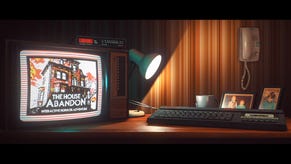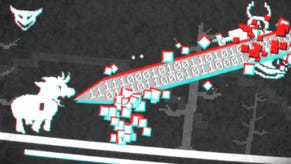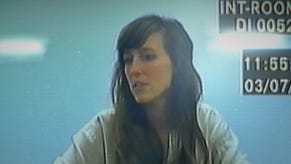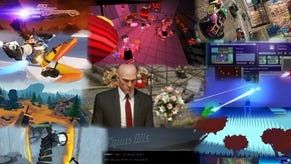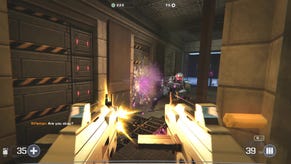Wot I Think: Her Story
Just one more thing
A camera records the statements that a woman makes to the police in relation to her missing husband. Years later, you sit at a computer and search through a video database by typing in keywords. The computer searches for the keywords in transcripts of the statements and returns up to five results. To dig deeper, you'll have to make connections, combine words, play detective.
Her Story [official site] is a game about crime and investigation from Aisle and Silent Hill: Shattered Memories designer Sam Barlow, and it's one of the best in its field.
As well as being a superb detective game, Her Story might be the best FMV game ever made.
You might not think that's a great compliment. Live action games are often thought of as duds, remembered for the damp squib controversy of Night Trap and the rushed recordings of tie-ins such as The X-Files Game. The fucking lightgun games (Mad Dog McCree, people in the Pilsworth arcade in the early nineties thought you were the future), the under-acting and dismal gore of Phantasmagoria.
Celebrated games, as well as those with enthusiastic cults of followers, have used FMV effectively but Her Story's usage isn't just effective – it is a game constructed from video rather than code. The code is there but it is the thread that holds the video together. This is the only game I've ever played that requires the glare of a CRT screen and the visual imperfections of worn VHS. It's a masterpiece of interface design, comparable to Uplink. The screen is your screen and you're typing commands directly into the database software from your keyboard. You can move windows around on the screen using your mouse. You are the character.
Her Story is releasing on tablet as well as PC but, to my mind, the interface makes it more of a natural fit for the PC than any shooter with a thousand graphical sub-menus. Aesthetically, it's perfect in that it's precisely what it wants and needs to be.
Enough of how it looks and feels. Let's dig.
The deepest layers of Her Story are reminiscent of Barlow's superb one-move interactive fiction game, Aisle. As a compelling criminal case and character study, it is as strongly written as anything else I've played recently (and read or watched, for that matter), but it also succeeds brilliantly as a story about stories. It's a dialogue between player and writer, a conversation between the performance and the credibility of the many individual tales that contribute toward the answers you're seeking.
The performance is as remarkable as the writing. If Viva Seifert didn't remain convincing throughout, the whole thing might collapse. Her expressions and intonation suggest the pressure of the interview scenario as well as context that is only understood later, if at all. We're left with a fractured portrait of an entire person rather than the nods, winks, grimaces and smirks of LA Noire's technological innovation.
Each short clip has awkward elements, particularly the appeals to the off-screen characters. There's an artificiality to the delivery that is wholly intentional – part of the appeal of the game is in deciphering what IS performed and what is natural, for the character rather than for Seifert. The situation, the interview room, is conducive to play-acting and I've found myself re-running clips through the lens of knowledge that came later in an attempt to figure out if what I thought was genuine was in fact another lie.
As I played, my approach shifted dramatically. At first, I was content to skim across the obvious questions (murder, alibi, motive, body) but I quickly became interested in the 'why' rather than the 'how'. That question spans years of confused memories, mysteries and surprising developments. Her Story became a personal investigation that eventually and stealthily lead me back to the role of detective.
I have three A4 pages of notes, tracking events, cross-referencing details, picking out contradictions. It's a dissection of life based on assumptions that seem inevitable and insights that are mine and mine alone. There are details that touched on the weirdness of my own family history and that familiarity is another element of the game's power. Particularly for a British audience, there are so many recognisable hooks on which to hang either your hat or yourself in passing. The places, the current events (current in 1994), the local pub, the snares and claws of the class system, the technology, the pop culture – they are part of the fabric of life and memory.
There are broader themes and references at the foundations of the story. One of the processes that Barlow seems keen to investigate, and to have players investigate, is that of self-mythologising and of framing our own family portraits in some Bigger Picture. I don't want to mention the touchstones used but it's the one area of the game that I thought might get too cute with self-referential playfulness. It doesn't. One of the smartest aspects of what is a very smart game is its ability to engage with its own structural oddities playfully without incorporating a single moment that steps outside the period setting or video archive conceit.
Those previous paragraphs might lead you to believe that the central mystery of Her Story is left unsolved and that the game is more interested in its characters than in the crime. Not so. Where the focus lies is up to the individual player, at least in part. There is a missing person, however, and by accident or design you can find answers to most of the big questions about that mystery. Some, you might think, are a little too convenient. Discard them. Search for other answers, ones that fit your expectations or the loose impressions you've already converted into facts.
It's astonishing to revisit a clip that I first watched at the beginning of the game and hear a different meaning in the same words. There have been Eureka moments when I've felt like the world's greatest detective (cowl optional) and there have been moments of unsettling doubt when a theory has not only threatened to collapse but to undermine my entire judgement of a character in the story.
Even more astonishing is that Her Story is non-linear and yet demonstrates mastery of editing, a craft rarely considered in games. I don't think I've ever talked about the editing in a game before but if there was an award for best editing, Her Story would win it. The editing might also be the most important work in a game that is already defined by superb writing and a brilliant performance.
Film theorists and critics sometimes describe editing as the grammar of the medium. The performances, mise en scène, music, audio – all of the things in and around the shot – are language. During the edit, order is imposed on those things. In the case of Her Story, that order is posing as disorder, but it's an intentional and devilishly intelligent sort of disorder.
Query the database with what you believe to be a breakthrough word or phrase, having deduced something of great importance, and the first clip it returns will often offer a retort, gentle mockery or muddying of the waters. You're an unseen presence, an observer after the fact unable to touch or influence proceedings, but the database has been constructed so that it is able to respond to your probing. The writer, the editor, the direction and the performance are playing with you, predicting the trains of your thought and switching the signals as you go.
At one point, with almost the entire database unlocked and viewed, I alt-tabbed out to make a note for this review. “If Michael Haneke made a game – Funny Games?” I disagree with myself so I'm glad I left that question mark. Even when Her Story made me feel like a voyeur, rummaging through the wreckage of lives to find juicy details that were probably only tangentially related to the case at best, I never felt that there was judgement involved. Funny Games looks down the camera, into the viewers' eyes, and asks them to question their desire to see people suffer.
Her Story doesn't reproach the player, not even gently. It's an inquisitive game and its inquisition works in both directions. As you question the flickering, humming time capsule of a machine, the game is teasing out your thoughts and feelings about what it reveals. You'll start to think of your search terms as direct questions and there are those brilliant moments when the game seems to guess what the next input will be, laying traps (and sometimes even jokes) that work as a direct response to you rather than to the unnamed detectives in that room, twenty years ago.
When all was said and done, I felt that my curiosity had been rewarded rather than rebuked. Her Story recognises that we have a habit of slowing down and craning our necks when we pass an accident, but it also trusts us to temper that urge with empathy. Maybe if we were separated from these events by a window and a motorway lane rather than a screen and impassable years, we'd slow down enough to pull someone out of harm's way.
Her Story is out on the 24th, this Wednesday.








